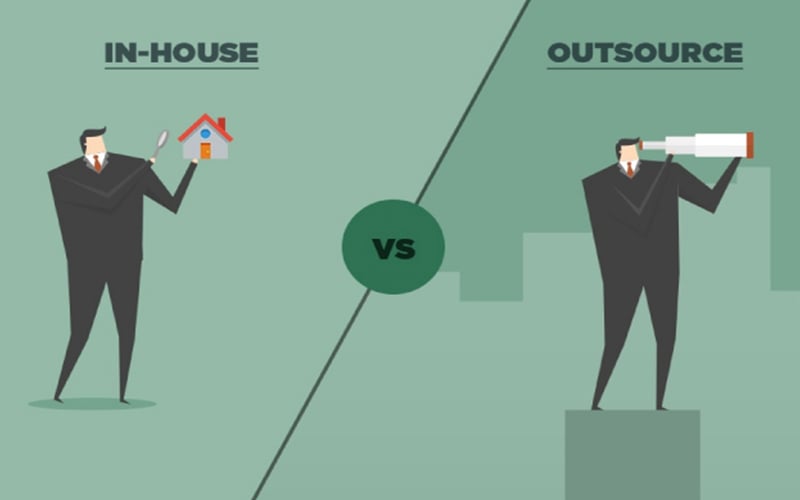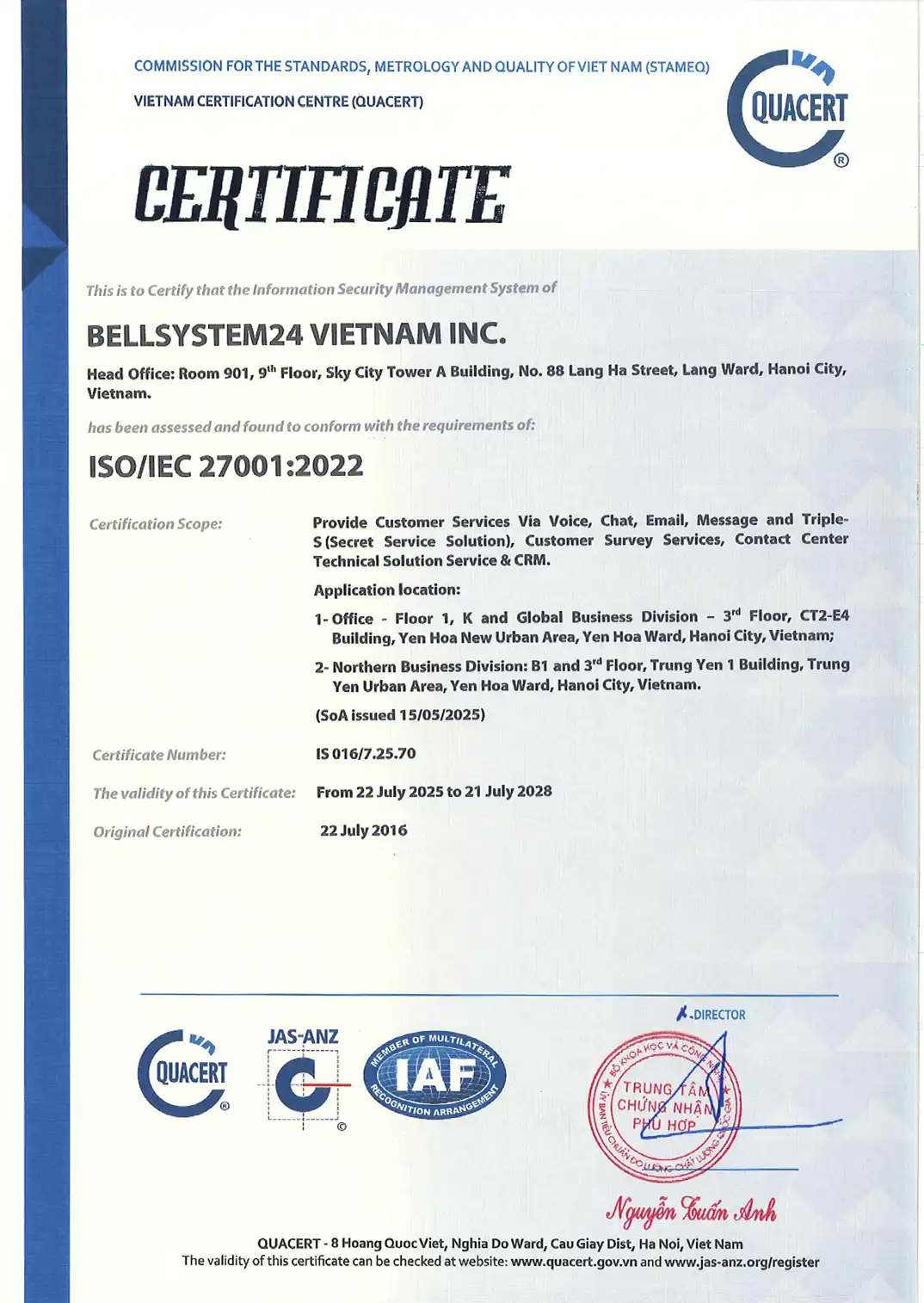These are two terms that experts use to refer to the methods of implementing business activities that take place inside and outside of an organization/enterprise. In the article below, BellSystem24-Vietnam will summarize the basic information of each type of activity, helping you have the best overview and make a decision to choose the most suitable option for your business in the context of business development.

1. What is in-house? Advantages and disadvantages of in-house
What is inhouse?
Inhouse is a term referring to the implementation of business activities using internal personnel. During the business process, there are a number of activities that need to be implemented, depending on the stage and orientation of the business, there are activities that are carried out by internal personnel. (inhouse) implement or be able to implement outsourcing (outsource)
Benefits of implementing inhouse activities
For a business, applying Inhouse into business will have the following advantages:
- The message is conveyed clearly and in the right direction. Because internal staff can work directly with managers, clearly understand the wishes of leaders, making it easier to plan and implement.
- Internal staff are always enthusiastic and dedicated
- Sharing a workspace, therefore not limited by distance, more convenient in exchanging work.
Disadvantages of applying in-house in business operations chain
Despite its advantages, inhouse still has many disadvantages:
- Non-specialized leading to low work efficiency. In reality, no business can guarantee to perfectly handle all problems during the operation process. Therefore, in the business operation chain, the business has one or more "dark spots" that the in-house staff does not or cannot meet in terms of professional qualifications, or needs to solve difficulties at a certain step that requires experts. These obstacles lead to work efficiency and directly affect the revenue and customer satisfaction with the business.
- Inflexible operating costs: Businesses will see this problem most clearly when there are short-term projects. If using full-time internal staff, the business needs to pay for recruitment, training, salaries, taxes, bonuses, facilities, etc. After the project ends, there needs to be a plan for arranging this seasonal staff, creating a burden for the unit.
In addition, regularly deploying in-house human resources also causes overload, employee fatigue, negative reactions, and reduced work performance...
What is outsourcing? Advantages and disadvantages of outsourcing
Because in-house still has certain shortcomings, businesses today seek new solutions to optimize business operations such as using Outsource services.
What is Outsourcing?
Outsource or Outsourcing is becoming more and more popular recently. This is the term used to describe the outsourcing of business operations of an organization/enterprise. Currently, the IT, hotel and tourism industries, Customer Service,… are the industries that most frequently use Outsourcing services.
Benefits of using Outsourcing solutions.
- Save investment costs: Businesses cut down on staff structure, saving costs on salaries, allowances, training, recruitment, etc. and many other benefits for official employees.
- Ensuring high productivity and efficiency: Outsourcing service providers always focus on providing the most stable quality of human resources. The staff provided by these organizations have been thoroughly trained, through specialized and advanced professional courses to best meet customer satisfaction. Therefore, the work processing speed is good and always ensures high accuracy.
- Focus resources on core products: Instead of spending money on sideline activities, businesses can use outsourcing services to spend more time and resources on core business activities, to optimize sustainable values and increase revenue.
Some disadvantages that may be encountered when using Outsourcing services.
Outsourcing brings great value to businesses, but there are still some disadvantages:
- Difficult to control service quality: This is a difficult and common problem if the unit does not choose the right Outsource service provider with high expertise and professional service attitude. This can affect the quality of the business's service to customers, causing customer dissatisfaction.
In addition, if during the outsourcing process, you do not have a suitable management mechanism to unify the coordination process between the In-house department and the outsourcing department, it will likely lead to internal disunity, hired employees will not coordinate well with the activities of internal operating personnel... business operations will be at risk of stagnation.
Which option is right for your business?
In the opinion of CEO BedLinker Sharing, for businesses, choosing a professional Outsource service provider can help them save a significant amount of money, while also being committed to the implementation progress, without delaying the time to operate business strategies.
Especially for newly established or small-scale enterprises, facing a series of economic difficulties, if they only focus on developing an In-house team, it means that the unit has to pay a rather large budget compared to outsourcing. In addition, in-house development enterprises also have to bear additional risks when recruited personnel are inexperienced, do not meet the job requirements or suddenly change the nature of the work.
Experts assess that the options of building an in-house or outsourcing staff both have certain advantages and disadvantages. However, if a business chooses Outsourcing, it will be guaranteed first of all the speed of work implementation with high efficiency, on time and with a commitment to progress from the Outsourcing service provider.
For example: A startup with a team of about 10 people can build product X in about 1 year, but the pressure from market demand requires this progress to be faster if the startup wants to have the advantage of "being the first to enter the market" before product X is out of date. Meanwhile, with an experienced team from an Outsource service provider, they can do it in much less time than an in-house team. Therefore, businesses should consider choosing the outsourcing option to have a commitment, to avoid delays.
In contrast to this view, another group of experts believes that choosing to build an in-house human resources team is still the optimal and sustainable solution with quality for small-scale or newly established businesses.
According to these experts, investing in launching a product within a few months is an advantage when comparing hiring a professional outsourcing team and building an in-house team. But what is more important is the understanding of the product and the right development roadmap at many different stages, which only an in-house team can undertake.
In short, Inhouse and Outsource both have their own advantages and disadvantages, so which option a business should choose depends on the business orientation and development strategy of the unit.







